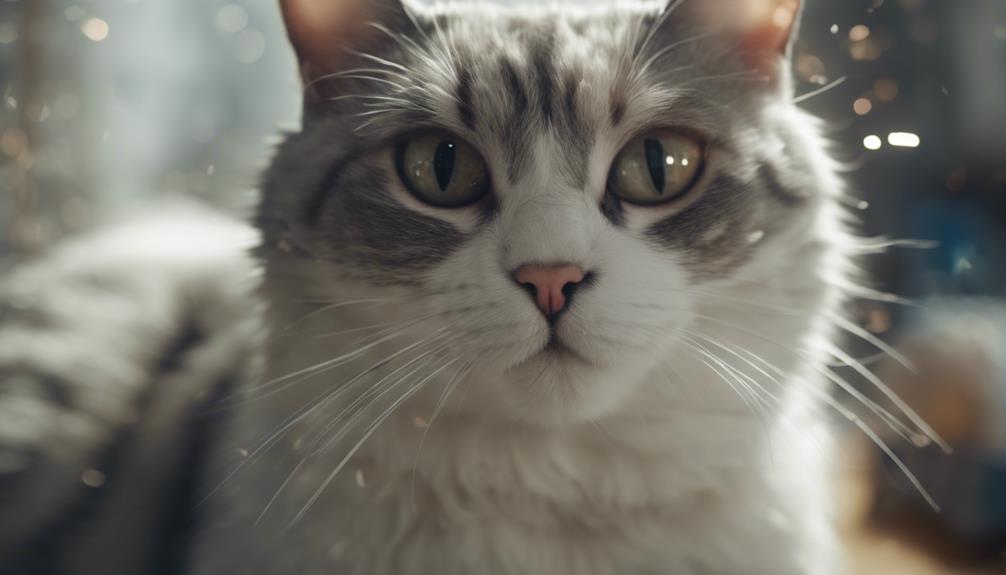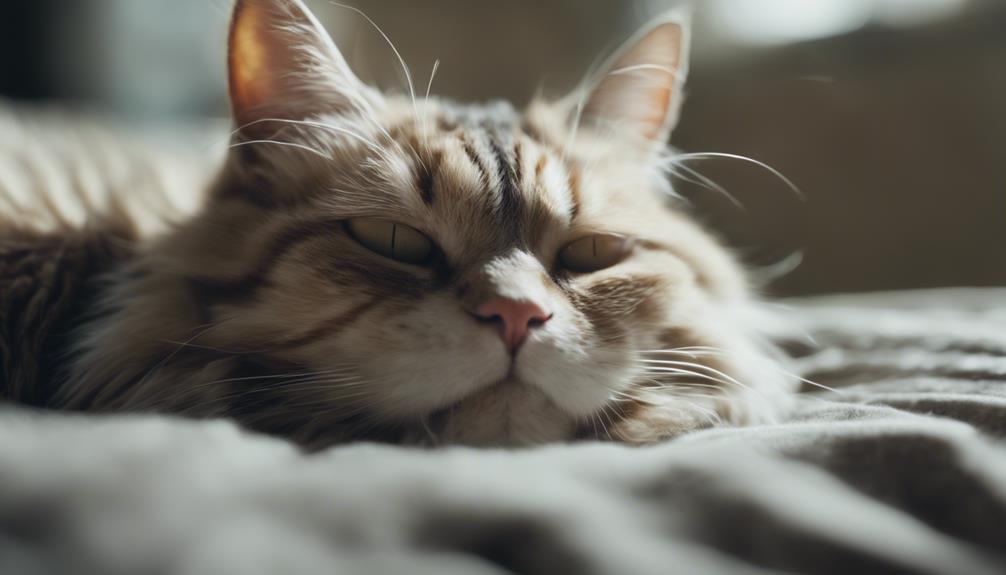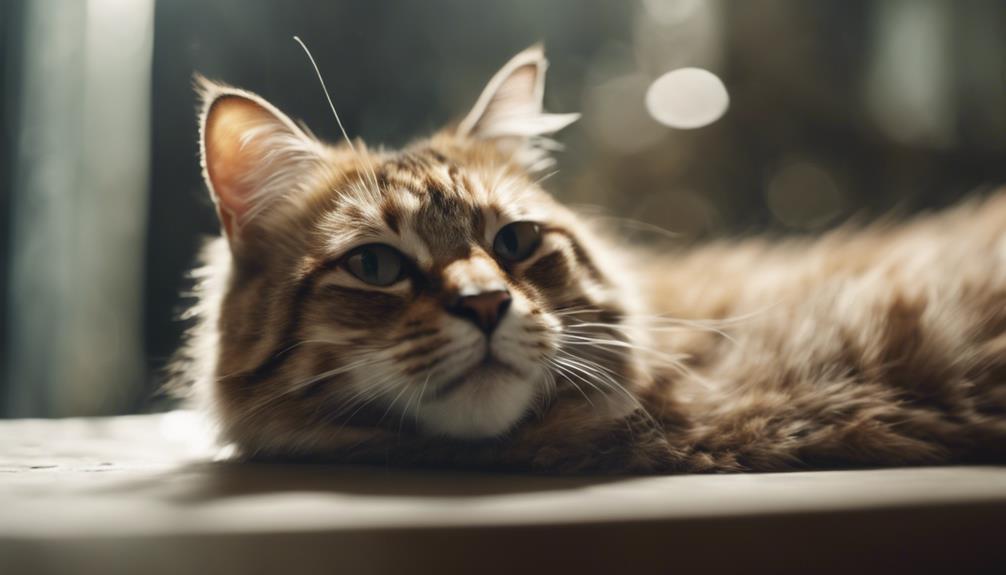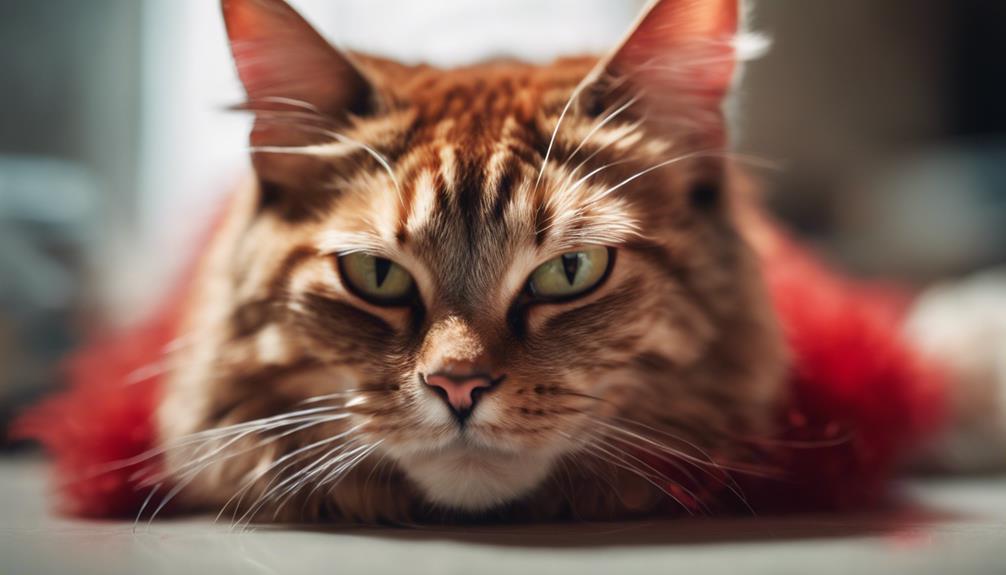Pneumonia in cats can arise from various factors, ranging from bacterial infections to environmental irritants, leading to concerning symptoms like coughing and breathing difficulties. Understanding the root causes and identifying the early signs is pivotal for swift intervention and effective treatment.
From antibiotics to supportive care, the management of feline pneumonia demands a comprehensive approach, potentially including hospitalization in severe instances. However, beyond treatment lies the realm of prevention and holistic care for cats battling this respiratory condition.
Delving into the nuances of pneumonia in cats unveils a multifaceted landscape of challenges and strategies that can significantly impact feline well-being.
Key Takeaways
- Pneumonia in cats can be caused by various factors like bacteria, viruses, fungi, aspiration, and parasites.
- Recognizable signs include breathing difficulties, coughing, wheezing, and fatigue with nasal discharge.
- Cat-to-cat transmission is common except for aspiration pneumonia, and immune health plays a crucial role in prevention.
- Treatment involves veterinary care, tailored to the pneumonia type, including medications, decongestants, and possible hospitalization.
Causes of Pneumonia in Cats
Bacterial or viral pneumonia, along with fungal, aspiration, and parasitic pneumonia, are common causes of pneumonia in cats, often linked to respiratory infections and environmental exposures. Bacterial and viral pneumonia typically stem from cold or upper respiratory infections, while fungal pneumonia arises when cats inhale fungal spores from soil.
Aspiration pneumonia occurs when foreign substances like water or vomit are inhaled, and parasitic pneumonia results from lungworms or flukes acquired through consuming prey or tainted water. Inflammation of the lungs leads to breathing difficulties and low oxygen levels.
Understanding these causes is crucial for prompt diagnosis and tailored treatment to ensure the well-being of our feline companions.
Signs and Symptoms of Pneumonia
Respiratory distress and observable physical manifestations serve as key indicators for identifying pneumonia in cats. Symptoms include breathing difficulties, noisy breathing sounds, wheezing, coughing with pus or blood, fatigue, and nasal discharge.
These signs may vary in severity depending on the type of pneumonia present. It is essential for cat owners to monitor their pet's respiratory patterns and behavior closely, as early detection can lead to more effective treatment.
Seeking veterinary care promptly is crucial to ensure proper diagnosis and appropriate management. By recognizing these symptoms and acting swiftly, cat owners can help their feline companions recover from pneumonia and prevent potential complications.
Contagion and Prevention in Cats

Contagion of pneumonia in cats can occur between feline companions, with the exception of aspiration pneumonia. Cats living in close quarters or multi-cat households are more susceptible to transmission.
While people are typically resistant to feline respiratory diseases, there are exceptions like bird flu. Cats with weakened immune systems are at a higher risk of contracting pneumonia.
To prevent the spread of pneumonia, ensure proper ventilation in living spaces, maintain good hygiene practices, and promptly isolate sick cats.
Regular veterinary check-ups, vaccinations, and a balanced diet can help bolster a cat's immune system, reducing the likelihood of pneumonia. Early detection and intervention play a crucial role in preventing the spread of pneumonia among feline companions.
Treatment Options for Pneumonia
To effectively manage pneumonia in cats, veterinary attention is crucial to determine the appropriate treatment options based on the specific type of pneumonia present. Treatment may involve antibiotics or anti-fungal medications, decongestants to reduce airway swelling, and in severe cases, hospitalization, oxygen therapy, and fluids. Home care plays a significant role in the recovery process, creating a healing environment with warm, cozy spots for resting, providing fresh water and moistened kibble for hydration, and eliminating aerosols and fragrances. Maintaining good overall health through proper nutrition, exercise, regular check-ups, and vaccinations is essential. Below is a table summarizing the treatment options for pneumonia in cats:
| Treatment Options | Description | Benefits |
|---|---|---|
| Antibiotics | Fight bacterial infections causing pneumonia | Target specific pathogens |
| Anti-fungal Medications | Combat fungal pneumonia infections | Aid in clearing fungal spores |
| Decongestants | Reduce airway swelling for easier breathing | Improve respiratory function |
Bacterial or Viral Pneumonia

Bacterial or viral pneumonia in cats is a common type of respiratory infection often triggered by exposure to cold or upper respiratory viruses. When dealing with this type of pneumonia, it's important to consider the following:
- Prompt Veterinary Care: Early diagnosis and treatment are crucial.
- Symptom Monitoring: Watch for signs like coughing, fever, and difficulty breathing.
- Isolation: Keep the infected cat away from others to prevent transmission.
- Medication: Follow the veterinarian's prescribed antibiotics or antiviral drugs diligently.
Understanding the nature of bacterial or viral pneumonia helps in providing the necessary care and support for your feline friend's recovery.
Fungal Pneumonia in Cats
Fungal pneumonia in cats typically arises when felines inhale fungal spores present in the environment. These spores can come from soil, plants, or decaying organic matter. Cats with weakened immune systems are more susceptible to developing fungal pneumonia. Common fungi responsible for this condition include Aspergillus and Cryptococcus. Prompt diagnosis and treatment are essential to prevent the spread of the infection and potential complications.
| Common Fungal Pathogens |
|---|
| Aspergillus |
| Cryptococcus |
| Histoplasma |
Aspiration Pneumonia Overview

Aspiration pneumonia in cats occurs when foreign substances, such as water or vomit, are inhaled, leading to inflammation of the lungs and potential breathing difficulties.
- Can occur when cats accidentally inhale food or liquid into their lungs
- Commonly seen in cats with certain health conditions like megaesophagus
- Symptoms may include coughing, difficulty breathing, and lethargy
- Diagnosis often involves X-rays and evaluation of respiratory distress
Understanding the causes and symptoms of aspiration pneumonia is crucial for prompt veterinary intervention and effective treatment.
If you suspect your cat may be experiencing aspiration pneumonia, seek immediate veterinary care to ensure the best possible outcome for your feline companion.
Parasitic Pneumonia Risks
Parasitic pneumonia in cats poses a significant health risk, commonly caused by lungworms or flukes contracted through the consumption of prey or tainted water. Lungworms, such as Aelurostrongylus abstrusus, can infect cats when they ingest intermediate hosts like snails or slugs. On the other hand, flukes like Paragonimus kellicotti can be transmitted through eating raw or undercooked crayfish.
These parasites can lead to severe respiratory distress, coughing, and lethargy in affected felines. Prevention involves minimizing outdoor exposure, keeping prey animals away, and ensuring proper deworming protocols. If suspected, prompt veterinary care is crucial to diagnose and treat parasitic pneumonia effectively, preventing further complications and promoting a speedy recovery for the cat.
Inflammation of Lungs Impact

The impact of inflammation of the lungs on cats experiencing pneumonia significantly affects their respiratory function and overall well-being.
- Breathing Difficulties: Cats may struggle to breathe normally due to the inflammation affecting their lung capacity.
- Reduced Oxygen Levels: Inflammation can impair the exchange of oxygen, leading to decreased oxygen levels in the bloodstream.
- Increased Respiratory Distress: The inflamed lungs can cause cats to experience heightened respiratory distress and discomfort.
- General Weakness: Cats with inflamed lungs may exhibit overall weakness and lethargy due to the strain on their respiratory system.
Home Care for Cats With Pneumonia
Providing appropriate home care is essential for supporting cats recovering from pneumonia. Create a healing environment for your feline friend by offering warm, cozy spots for resting. Ensure access to fresh water and moistened kibble to promote hydration. Eliminate aerosols and fragrances that could irritate their sensitive respiratory system.
Maintaining good overall health through proper nutrition, regular exercise, routine check-ups, and up-to-date vaccinations is crucial for their recovery. Keep a close eye on their progress and consult with your veterinarian if you notice any concerning symptoms.
Frequently Asked Questions
Can Cats With a History of Respiratory Issues Be More Prone to Developing Pneumonia?
Cats with a history of respiratory issues may indeed be more prone to developing pneumonia. Chronic respiratory conditions can weaken the lungs, making cats susceptible to infections like pneumonia, necessitating diligent monitoring and care.
Are There Any Specific Breeds of Cats That Are More Susceptible to Pneumonia?
Certain cat breeds, like the Siamese and the Himalayan, are more prone to respiratory issues, potentially increasing susceptibility to pneumonia. Monitoring these breeds closely for any signs of respiratory distress and seeking prompt veterinary care is paramount.
Can Outdoor Cats Be at a Higher Risk of Contracting Pneumonia Compared to Indoor Cats?
Outdoor cats may face a higher risk of contracting pneumonia compared to indoor cats due to exposure to various pathogens in the environment. This increased exposure can lead to respiratory infections, making outdoor cats more susceptible to pneumonia.
How Long Does It Typically Take for a Cat to Recover From Pneumonia With Proper Treatment?
The recovery time for a cat with pneumonia varies based on the severity, type of pneumonia, and the individual cat's response to treatment. With proper veterinary care, a cat may start showing improvement within a few days to a couple of weeks.
Are There Any Alternative or Holistic Approaches to Treating Pneumonia in Cats That Can Be Effective?
Alternative or holistic approaches to treating pneumonia in cats may include acupuncture, herbal remedies, or homeopathy. While some pet owners find success with these methods, it's crucial to consult a veterinarian to ensure proper care and treatment efficacy.
Conclusion
In conclusion, understanding the causes, symptoms, and treatment options for pneumonia in cats is crucial for ensuring their well-being and overall health. Recognizing the signs of pneumonia, such as breathing difficulties, coughing, and fatigue, is essential for timely intervention.
Veterinary care, including antibiotics, anti-fungal medications, and supportive therapies, is necessary for treating pneumonia in cats. Providing a conducive home environment with proper nutrition and hydration can aid in the recovery process.




